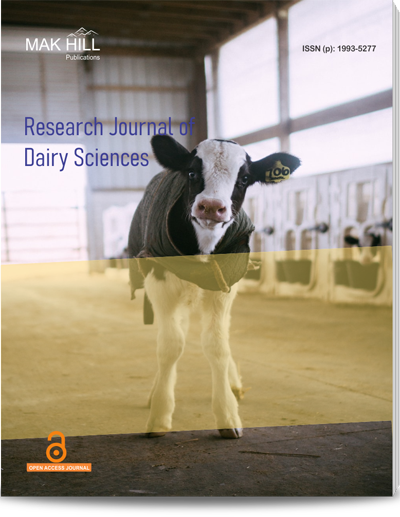
Research Journal of Dairy Sciences
ISSN: OnlineISSN: Print 1993-5277
Abstract
Antimicrobial agents for treatment of mastitis in dairy cows may result in drug residues in milk, suppressing production of fermented dairy products. Since, lactic acid from fermentation normally raises milk osmolarity, the objective of this study was to assess the validity of osmometry in evaluating effects of antimicrobial agents on milk fermentation. The 10 test tubes each containing ultra high temperature treated milk+starter culture (Lactococcus lactis sp. lactis) were prepared. Using serial double dilution, cloxacillin benzathine (dry cow) was added to 5 test tubes at 75-1200 mg L–1and erythromycin and trimethoprim (lactating cow) to the remaining 5 test tubes at 62.5-1000 mg L–1. A negative control with neither starter culture nor antimicrobial agent and a positive control with starter culture but no antimicrobial agent was included. All samples were incubated at 30°C for 2 days and osmolarity monitored by a cryoscopic osmometer. From a starting value of 301’1.72 mOsmol L–1(mean’SD), maximum osmolarity values after 2 days were 315’7.07 for non-inoculated antimicrobial-free milk, 463’19.91 for inoculated antimicrobial-free milk, 328’9.07 for inoculated milk containing erythromycin and trimethoprim and 507’35.53 for inoculated milk containing cloxacillin benzathine (n = 6). Results from negative and positive controls were consistent with absence and presence of normal fermentation, respectively. Erythromycin and trimethoprim significantly (p<0.05) inhibited fermentation at all concentrations throughout the incubation period. Cloxacillin benzathine exhibited significant inhibition at higher concentrations on day 1 of incubation but none on day 2.
How to cite this article:
Colin Musara and William Pote. Application of Osmometry in Evaluating Effects of Antimicrobial Agents on Milk
Fermentation.
DOI: https://doi.org/10.36478/rjdsci.2014.22.26
URL: https://www.makhillpublications.co/view-article/1993-5277/rjdsci.2014.22.26